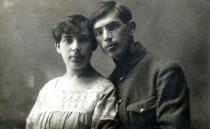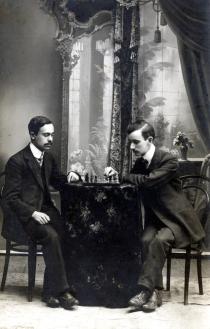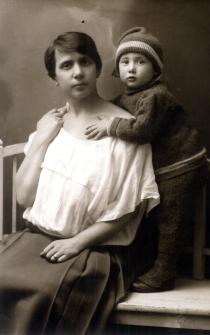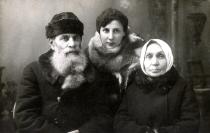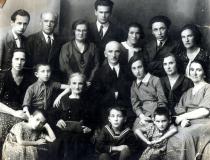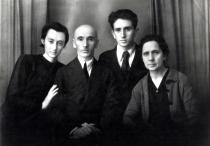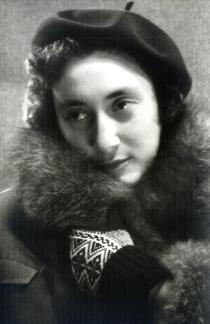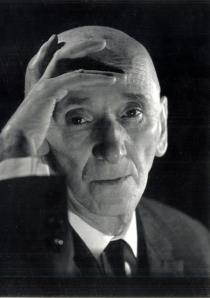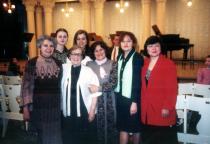Our family reunion for the 70th birthday of my paternal randmother Rivka Deich in Kiev in 1937. The photograph was taken per special order by a photographer at the central photo shop.
From left to right, standing in the upper row are: my cousin Semyon Kertman, my uncle and aunt Haim and Maria Kertman, my cousin Leo Kertman, my aunt Hana Grinberg, her husband Misha Grinberg and my aunt Nelly Deich. Sitting from left to right are: my mother Rivka Deich, my grandmother on my father's side, Rivka Deich , my brother Samuel Deich, my father Aron Deich, I and my aunts Bronia Deich and Polia Deich. The children sitting at the bottom, from left to right are: my cousins Regina Grinberg, Victor Paniakh and Jemma Grinberg.
My grandmother on my father's side was born at the end of 1866. She was a housewife. I don't know where she was educated, but she could read and write in Yiddish and knew Hebrew. She also spoke English. My grandmother corresponded with her sisters, Surchik and Milka, who lived in the US since the 1900s, in Yiddish for many years. Unfortunately, their letters got lost, so I don't know any more about them. My grandmother was very religious. She always prayed and celebrated Sabbath and all Jewish holidays.
My grandparents had six children: five daughters and a son. The children were not raised religiously. All girls received their education at home and were very intelligent, educated and well-read ladies.
My father's oldest sister, Polia Deich, was born in 1890. She, her husband Israel and their children Fira and Dauvd lived in Leningrad. During the war they were in evacuation but David was in Leningrad as a correspondent. Polia and Israel died in evacuation. Fira returned to Leningrad. Fira and David died in Leningrad in the middle of the 1970s.
My father's second oldest sister, Maria Kertman, was born in 1892. Maria was a hat-maker and worked at home. Her husband, Efim Kertman, was religious. After the Revolution of 1917 he couldn't get adjusted to the new regime. Besides, he was epileptic. He didn't work. His family lived on what Maria managed to earn. Maria died in the early 1950s. Her older son, Semyon, graduated from some institute and was chief production engineer at a plant in Kiev. Her younger son, Leo, graduated from Kiev University before the war and got married. His wife and he were lecturers at Kiev University. Leo taught history and his wife was a professor of Russian literature. In 1949 they were accused of being cosmopolitans and fired. They moved to Perm. Leo died in 1989 and Sarah passed away in the early 1990s.
My father's third sister, Bronia Deich, was born in 1898. She worked as a clerk at a plant in Kiev. She was single. She died in the middle of the 1970s.
The next sister, Hana Grinberg, was born in 1900. She was the first of all the children to receive education. She finished the Froebel Institute and got a diploma for work with handicapped children. During the war Hana and her children were in evacuation in Middle Asia, where they almost starved to death, and then moved to Kazan. She was a teacher and later the director of an orphanage for handicapped children in Kazan. Hana died in 1982 and was buried in the Jewish cemetery in Kiev. Her daughters, Jemma and Regina, were single. Regina went to Ivanovo after the war and managed a theater. Jemma is a pensioner now and lives in Kiev.
My father's youngest sister, Nelly Deich, was born in 1904. She studied at the Pedagogical Institute in Leningrad. She married Moisey Paniakh, a Jewish man. Nelly and Moisey died in the middle of the 1980s. Their sons Victor and Alexandr live in Saint Petersburg now.
My father, Aron Deich, was born in 1893. He studied at cheder and went to work as soon as he could because my grandfather wasn't doing very well in his pharmacy. My father had to help to support the family. He never told me where he worked. In the middle of the 1920s he passed the exams at one of the schools in Kiev to get a certificate for secondary education. He was a very intelligent man and spoke and wrote excellent Russian. Besides, my father was a very talented man. He had a good knowledge of music and was very kind and sensitive.
My mother was born in Cherkassy in 1889. Before I was born my mother worked as a laborer at a plant, but after I was born she didn't go to work. My mother was a very good mother and housewife. We had a wonderful, cozy home, and my father and mother had a very warm and supporting relationship. My father adored my mother. They spoke Russian with each other and Yiddish with my grandmother.

